- Blog
- Plant Based Protein Is Shaping The Future Of Nutrition For Health Conscious Consumers
Plant-based Protein is Shaping the Future of Nutrition for Health-conscious Consumers
Published On : 24 Oct 2024
Plant-based proteins are rapidly emerging as a key component in modern diets, offering numerous benefits not only for personal health but also for the environment and the future of sustainable food production. As consumer demand shifts toward healthy, ethical, and environmentally conscious options, plant-based proteins are becoming a viable alternative to traditional animal-based sources.

Plant-based Proteins Boost Health and Sustainability
Plant-based proteins, derived from sources such as peas, lentils, soy, chickpeas, and quinoa, offer a range of essential nutrients that support an individual’s health. Unlike animal proteins, which can be high in saturated fats and cholesterol, plant proteins provide clean, nutrient-rich options that are free of harmful additives.
The proteins are rich in essential amino acids that our bodies need to build and repair tissues. While some plant proteins may lack one or two essential amino acids, combining different plant-based foods like beans and rice can ensure a full amino acid profile. In addition to protein, plant-based foods are abundant in fiber, vitamins, and minerals such as iron, magnesium, and calcium.
Fiber is particularly important for digestive health, and plant-based proteins are excellent sources of it. Fiber helps maintain regular bowel movements and supports a healthy gut microbiome. Several plant-based proteins are also rich in antioxidants, which combat inflammation and reduce the risk of chronic diseases like heart disease and cancer.
Plant-based proteins are also naturally lower in calories compared to animal proteins, making them ideal for individuals looking to maintain a healthy weight or improve their cardiovascular health. As they are low in saturated fats, they help reduce bad cholesterol levels and lower the risk of heart disease.
Reducing Carbon Footprints and Supporting Animal Welfare through Diet
Plant-based proteins go beyond personal health. They offer substantial environmental and ethical advantages. Traditional livestock farming is resource-intensive, contributing significantly to greenhouse gas emissions, deforestation, and water depletion. In contrast, the production of plant-based proteins requires fewer resources, generates less pollution, and has a small environmental footprint.
Livestock farming is responsible for around 14.5% of global greenhouse gas emissions, primarily methane, which contributes to climate change. Switching to plant-based diets, including protein supplements, can dramatically reduce these emissions, as growing crops for human consumption requires less land and water than raising animals for meat.
Plant-based proteins help address ethical concerns related to animal welfare in addition to environmental benefits. By opting for plant-based sources, consumers can reduce demand for industrial animal farming, which often subjects animals to poor living conditions and inhumane treatment.
Plant-based proteins are far more scalable and can help address global food security challenges from an accessibility standpoint. As the global population continues to grow, providing sufficient animal protein for all will become increasingly difficult and unsustainable. As per the United Nations (UN), by 2050, the global population is anticipated to rise to 9.7 billion.
Plant-based proteins offer a more equitable solution that can be produced on a larger scale without exhausting natural resources. They are also more affordable and accessible in various regions, including parts of the world where animal protein is a luxury.
Noteworthy Product Launches in the Plant-based Protein Industry
- In July 2024, Ingredion Incorporated, based in the U.S., launched a pea protein called Vitessence Pea 100 HD in the form of cold-pressed bars to expand its protein fortification solutions across North America. The energy bars can remain soft throughout their shelf life and offer sensory attributes.
- In June 2024, Plantaway, a plant-based food company based in India introduced its new 100 percent Plant Protein Chick'n Fillet. It is mainly made of pea protein and was made to fulfil the growing demand for superior-quality plant-based food options in the country.
- In May 2024, France-based Roquette unveiled NUTRALYS Fava S900M for North America and Europe. It is considered the company’s first-ever protein isolate obtained from fava beans. The company plans to broaden its NUTRALYS pea protein range by introducing new plant protein ingredients in future.
- In January 2024, a subsidiary of the ETSA Group, Sebol, headquartered in Portugal, announced its plans to develop a state-of-the-art industrial unit in Coruche. The company has invested around €15.4 million to construct the facility to produce hydrolyzed protein, especially for the aquafeed sector.
Plant-based Proteins to Dominate Tomorrow’s Nutrition with Innovations in Food Science
The future of sustainable protein production lies in innovative alternatives like plant-based proteins, lab-grown meat, and other sources. As global demand for protein rises especially in developing countries, it is clear that plant-based options will play an essential role in meeting these needs while safeguarding the planet.
One of the most promising aspects of plant-based proteins is their potential to mimic animal-based products more closely. Advances in food science are expected to enable companies to develop plant-based alternatives that replicate the taste, texture, and even cooking behavior of traditional meat. This is likely to help broaden the appeal of plant-based diets, even among meat-eaters, and make it easier for consumers to adopt these options.
Sustainable agricultural practices, such as vertical farming and regenerative farming, are further projected to help increase the efficiency and sustainability of plant-based protein production. These methods are set to reduce the environmental footprint of agriculture by using less water, minimizing land use, and enhancing soil health.
As innovation in food technology accelerates, plant-based proteins are poised to become more versatile and integrated into various food products. From plant-based burgers and dairy alternatives to protein-enriched snacks and beverages, the variety of options available continues to expand, offering consumers an array of delicious and nutritious choices.
Industry Report

Request Report Sample
Your privacy is important to us; your data is secure
Contact Us
Latest Reports
-
Baby Powder Market by Ingredient Type (Talc-based, Talc-free), Packaging Type (Plastic Bottles, Sustainable/Eco-tins, Sachet/Pouches, Others), Distribution Channel (Offline, Online), and Regional Analysis 2026 – 2033
-
Duck boots market by Product Type (Insulated Duck Boots, Waterproof Duck Boots, Fashion Duck Boots, Thermal Lined Duck Boots), Material (Rubber, Leather, Textile, Combination Materials), End-user (Men, Women, Kids), and Regional Analysis for 2026 – 2033
-
Extruded Polylactic Acid (PLA) Fiber Market by Fiber Type (Monofilament PLA Fiber, Multifilament PLA Fiber, Staple PLA Fiber, Tow PLA Fiber, Specialty PLA Fiber), Grade (Standard Grade, High-Performance Grade, Bio-modified/Enhanced Grade), End-user, and Regional Analysis, 2026 - 2033
-
Tea-Based Skin Care Products Market by Tea Type (Green Tea, Black Tea, Others), Product Form Type (Creams & Lotions, Serums, Cleansers & Masks), Application (Facial Care, Body Care, Others), and Regional Analysis 2026 - 2033
-
North America eVTOL Aircraft Lift Technology (Vectored Thrust, Multirotor, Lift Plus Cruise), Mode of Operation (Piloted, Autonomous, and Semi-Autonomous), Range (0-200 Km, and 200-500 Km), Maximum Take-off Weight (MTOW) (<250 Kg, 250-500 Kg, 500-1500 Kg, and >1500 Kg), Application (Commercial, Military, and Emergency Medical Service), Propulsion Type (Battery-Electric, Hybrid-Electric, and Hydrogen-Electric) Analysis for 2026 - 2033
